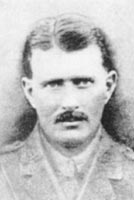
One of the six before Breakfast
|
Capt Cuthbert
Bromley

Birth: Sep. 19, 1878 World War I Victoria Cross Recipient. Bromley was born in Seaford, Sussex, the son of Sir John and Lady Bromley. In school he was reported to be an enthusiastic athlete but an indifferent student, so his original plans to pursue a career in either medicine or the civil service were out. Instead he joined the Army, gaining a commission in the 1st Battalion of the Lancashire Fusiliers after a stint in the 3rd King’s Liverpool Regiment, a militia unit. He saw service in West Africa and India, where, under his leadership as adjutant the battalion won a number of Army championships in football, boxing, and cross-country running. Bromley was awarded the V.C. for action during the landings at W Beach during the Gallipoli Campaign, April 25, 1915, one of the group known in the press as “The Six V.C.s Before Breakfast (the others were Capt. R.R. Willis; Sgts. A. Richards and F.E. Stubbs; L/Cpl. Grimshaw; and Pvt. W. Kennealy). Bromley’s citation read: “On the 25th April, 1915, headquarters and three companies of the 1st Battalion, Lancashire Fusiliers in effecting a landing on the Gallipoli Peninsula to the West of Cape Helles, were met by very deadly fire from hidden machine guns, which caused a great number of casualties. The survivors, however, rushed up to and cut the wire entanglements, notwithstanding the terrific fire from the enemy, and after overcoming supreme difficulties, the cliffs were gained and the position maintained. Amongst the many very gallant officers and men engaged in this most hazardous undertaking, Captain Bromley, Serjeant Stubbs, and Corporal Grimshaw have been selected by their comrades as having performed the most single acts of bravery and devotion to duty.” (The citation for Bromley, Stubbs, and Grimshaw was not issued until March 15, 1917, due to War Office regulations and red tape; the citation for Willis, Richards, and Kennealy, worded identically, had been issued on August 23, 1915.) Bromley injured his back in the action at W Beach but did not seek medical attention until wounded by a bullet in the knee on April 28. He was wounded again while in temporary command of the 1st Battalion (with promotion to Major) during the Battle of Gully Ravine on June 28. This time he was evacuated to Egypt to recover, and in August begged his way aboard the troopship Royal Edward to return to the Gallipoli peninsula. The ship never arrived. It was torpedoed and sunk by the UB-14 on August 13, 1915, with the loss of 866 lives, among them Bromley. His body was never recovered. His V.C. medal is privately held.
|